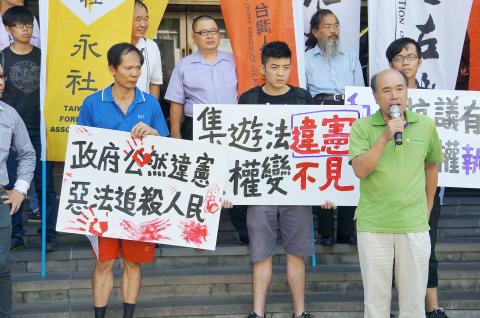Civic and human rights groups yesterday rallied outside the Taipei District Prosecutors’ Office as several participants in the April 11 demonstration outside Zhongzheng First Police Precinct headquarters arrived for questioning.
Activists from the Judicial Reform Foundation, the Taiwan Association for Human Rights, the Restoration of Taiwan Social Justice, Taiwan Forever and the Taiwan Association of University Professors held placards and flags, and chanted slogans accusing the government of acting unconstitutionally.
They also said the Assembly and Parade Act (集會遊行法) was unconstitutional.

Photo: Chien Lee-chung, Taipei Times
“I was not the ‘main culprit’ that night. The crowd had gathered on its own. I went there after seeing information on the Internet, and I actually helped to maintain order,” National Taiwan University student Hung Chung-yen (洪崇晏) said after he left the prosecutors’ office following questioning.
“I hope the prosecutors realize that peaceful assembly is a fundamental right of the people and refrain from prosecuting peaceful demonstrators,” he said.
Savungaz Valicinan, who said she was dragged into the precinct that night, said she had gotten upset when an officer lost his temper and slapped her.
“I was mad, and asked why he slapped me, and the next thing I knew I was being dragged into the building,” Savungaz said. “I asked the officers why they dragged me into the building, and a female officer told me: ‘You may leave now.’”
It did not make sense that nothing has happened to the police officer who slapped a peaceful demonstrator, she said.
“It is ironic that while I am preparing to sue the officer, I am now being sued by the police,” she said.
Judicial Reform Foundation deputy executive director Chen Yu-fan (陳雨凡) said that from the start of the Sunflower movement protests outside the Legislative Yuan to the demonstration outside precinct, there have been many instances of police officers abusing their power.
“So far, we have helped 200 demonstrators who are facing prosecution, and more than 70 people who have been questioned by the Taipei District Prosecutors’ Office, which has assigned four prosecutors to handle the cases,” Chen said. “I would like to know if the judicial system is making the same amount of effort in its handling of the abusive [police] officers.”
The demonstration by about 1,500 people on the evening of April 11 occurred after precinct chief Fang Yang-ning (方仰寧) ordered the forcible eviction of demonstrators — most of them mobilized by the Alliance of Referendum for Taiwan — outside the Legislative Yuan, despite his promise the previous night that he would not remove peaceful demonstrators by force.
Fang also announced that he would void the assembly and parade permission given to the alliance, and never approve a request for assembly and parade from the group again.
The forcible eviction shocked the public.
Critics of Fang’s actions said the right to assembly is protected by the Constitution, while the Assembly and Parade Act does not give the government the power to permanently revoke a group’s or an individual’s right to assembly.
Participants in the April 11 protest called on Fang to apologize and resign.
The demonstration ended — and many of its participants returned to the Legislative Yuan — after Fang apologized later that night and promised to turn in his resignation.

US President Donald Trump said "it’s up to" Chinese President Xi Jinping (習近平) what China does on Taiwan, but that he would be "very unhappy" with a change in the "status quo," the New York Times said in an interview published yesterday. Xi "considers it to be a part of China, and that’s up to him what he’s going to be doing," Trump told the newspaper on Wednesday. "But I’ve expressed to him that I would be very unhappy if he did that, and I don’t think he’ll do that," he added. "I hope he doesn’t do that." Trump made the comments in

NOT AN OPENING: Trump’s violation of international law does not affect China’s consideration in attacking Taiwan; Beijing lacks capability, not precedent, an official said Taiwanese officials see the US’ capture of the president of Venezuela as a powerful deterrent to Beijing’s aggression and a timely reminder of the US’ ability to defeat militaries equipped with Chinese-made weapons. The strikes that toppled Venezuelan President Nicolas Maduro signaled to authoritarian leaders, including Chinese President Xi Jinping (習近平), US President Donald Trump’s willingness to use military might for international affairs core to US interests, one senior official in Taipei’s security circle said. That reassured Taiwan, the person said. Taipei has also dismissed the idea that Trump’s apparent violation of international law could embolden Beijing, said the official, who was not

A cold surge advisory was today issued for 18 cities and counties across Taiwan, with temperatures of below 10°C forecast during the day and into tonight, the Central Weather Administration (CWA) said. New Taipei City, Taipei, Taoyuan and Hsinchu, Miaoli and Yilan counties are expected to experience sustained temperatures of 10°C or lower, the CWA said. Temperatures are likely to temporarily drop below 10°C in most other areas, except Taitung, Pingtung, Penghu and Lienchiang (Matsu) counties, CWA data showed. The cold weather is being caused by a strong continental cold air mass, combined with radiative cooling, a process in which heat escapes from

Snow this morning fell on Alishan for the first time in seven years, as a strong continental cold air mass sent temperatures plunging across Taiwan, the Central Weather Administration (CWA) said. The Alishan weather station, located at an elevation of about 2,200m in central Taiwan, recorded snowfall from 8:55am to 9:15am, when the temperature dropped to about 1°C, the CWA said. With increased moisture and low temperatures in the high-altitude Alishan area, the conditions were favorable for snow, CWA forecaster Tsai Yi-chi (蔡伊其) said. The last time snow fell at the Alishan weather station was on Jan. 10, 2018, while graupel fell there